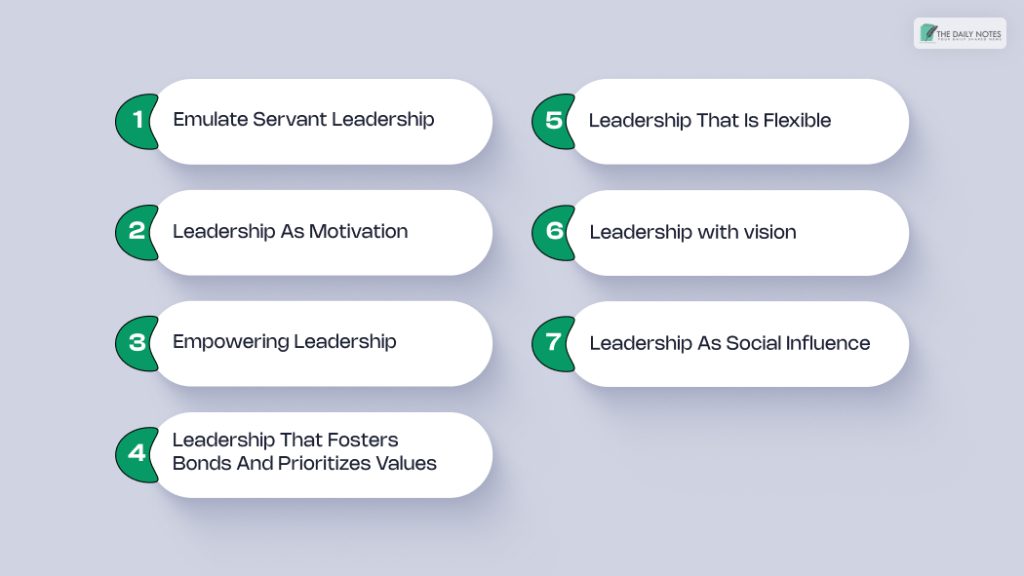Leadership skills are an essential aspect of your corporate life, especially if you plan to stay in the sector. Don’t get me wrong, leadership skills are useful in almost all aspects of one’s life. However, the corporate sector is the place where it’s genuinely instrumental. So, let’s look at the 7 definitions of leadership.
Since the Industrial Revolution, humans have undergone such revolutions thrice (we’re currently heading towards/living in IR 4!) Leaders have always known how to take things forward and get things done.
Moreover, per the contingency theory of leadership, a leader’s style must adapt to the situation as dictated by whether they are influential leaders.
How do you think that is? Leadership skills have been the wind beneath their wings, sometimes the same wind that fans the fire of their end.
Thus, the drastic difference in the role of leadership is what the different definitions of leadership represent.
What are the 7 Definitions of Leadership? Aren’t they the Same?

The short answer is – No. Just as different leadership styles exist, there are also other definitions. Seven different definitions of leadership should prove helpful to people starting a new business or a department that requires a complete team.
Leadership can mean differently for different people. There needs to be a correct or incorrect definition. These are the various definitions of leadership that are most common within the corporate sector. These definitions will be helpful for you, too, if you are wondering how to develop leadership skills.
And those that help get work done – one way or another. Let’s look at the different leadership definitions that your employees may have.
These are 7 definitions of leadership with examples:
1. Leadership that Inspires and Motivates

Only some get leaders like them. Finding leaders who naturally inspire you to improve is pretty rare. Be it professionally or personally, it is their influence that makes you a better employee.
When a leader can motivate and inspire others, they are the definition of motivating and inspiring leadership. The team members automatically become inspired to contribute their best towards a goal.
A leader with this skill to inspire their team members is more likely to drive better success rates for their team. They are also the ones who can get you to complete a task successfully – without forcing or burdening them.
In the debate of transactional vs transformational leadership, this definition is on the latter’s side.
A prominent example would be Steve Jobs, who made Apple what it is today. Another great example is Mahatma Gandhi, who inspired the citizens of pre-Independent India to step into an independent country.
2. Leadership with Social Influence

Leadership, where they bring social influence, is one of the strongest players in corporate leadership. Leaders who influence others to achieve a common goal are what your aim should be. They would be a significant part of your team, helping your organization reach goals sooner.
Leaders with this ability can quickly impact the feelings, thoughts, and actions of those around them. They are great at directing people towards a common objective. They are more likely to foster collaboration amongst team members.
Their influence is such that they can ethically guide their members with accountability and integrity. Their strong principles help them influence the team to embody their values and principles.
A striking example of a leader with social influence would be Nelson Mandela. He was such a strong influence in bringing change to South Africa.
3. Leadership with Visionary Thinking

The leader’s ability to envision their company’s future and create a plan for is one of the most critical leadership skills. One of the most important types of leadership definitions that you, as a business owner, should know about is the visionary thinker!
These leaders can look five years or even ten years into the future and achieve their goals. These visionaries will be the first to grab onto the growth opportunities.
One of the most deserving examples of a visionary leader would be the father of X Æ A-Ⅻ and Tesla, Elon Musk! He has taken his passion and vision to bring the idea of space exploration and electric vehicles.
4. Leadership that Empowers

Leadership is about distributing the tasks to those around them (in their team, sometimes not.) This empowers those around them to become better versions of themselves and bring change to their professional surroundings.
They are more likely to drive change within their workplace and make people better at taking responsibility. They become better at taking accountability for their work while having autonomy.
A prominent example of this leadership definition is Sundar Pichai. The CEO of Google is best known for encouraging employees to take risks, learning from their failures, and having groundbreaking insights.
5. Flexible Leadership

One of the most remarkable skills is navigating through difficult situations. This comes in handy when there is a problematic situation, and the team or organization needs to improve its game plan.
These leaders can guide members through transformations and change without significant resistance. They can be on a journey of unknown territory that helps them know what to anticipate and how to move forward.
Their role in such situations is to help their team comprehend the reason for the change, which can help them create a clear picture of the roadmap. It can cause distress and worry among people transforming, requiring a strong leader.
Leaders applying this leadership definition are necessary for such situations. They can provide training and ask for the team’s input on the change and the steps needed. This makes the team feel involved and encourages them to embrace the new confidently. A great example of this leadership type is Mark Zuckerberg.
He has been able to navigate challenges (we all know this) and has been able to embrace emerging trends, guiding his company in a new direction.
6. Leadership that Prioritizes Greater Good

This one of the 7 definitions of leadership describes servant leadership. As degrading as that sounds, it isn’t all that bad. The leader in this category is more like the support crew than the one who steals the spotlight.
They are keen on helping the team succeed more than getting praise for running the team. They are also the ones who will use team-building activities for work to make the team feel supported and valued.
These leaders are more likely to understand their team’s needs and pay close attention to what their team says. They are also great listeners who practice active listening, which helps them improve the team’s weaknesses and boost their strengths.
An example of this leadership definition is Martin Luther King, Jr. whose extraordinary power radically changed a nation.
7. Leaders Who Foster Relationship Building

The last of the 7 definitions of leadership is the leadership that fosters a culture that is based on building strong connections with others. They are focused on building strong connections with others – not just managers but their team as well.
This helps build a strong culture where values such as accountability and integrity are prioritized. The leader thus helps foster trust among the stakeholders, contributing to the organization’s credibility and reputation.
These leaders lead by example and focus on building rapport, trust, and collaboration. This leads to a team and organization environment that is supportive and positive. The members of such a leader feel empowered and valued.
A famous example of this leadership definition is Mary Kay Ash, founder of Mary Kay Cosmetics.
Tips to Implement these 7 Definitions of Leadership

Here are a few tips to help you implement the 7 definitions of leadership effectively in your professional space:
- If you want to emulate servant leadership, focus on the team’s needs and prioritize their well-being and growth. As a team leader, you are responsible for ensuring the right training and tools are available for them.
- If you want to implement leadership as motivation, understand what drives each team member and acknowledge their contributions. You should also provide positive reinforcement that motivates them to work harder.
- To implement empowering leadership, delegate meaningful responsibilities and tasks to your team members. Encourage your team members to make decisions that are within their scope, this encourages autonomy in them.
- Implement leadership that fosters bonds and prioritizes values by holding honest and transparent interactions. Maintain consistency in your behavior and decisions so that you follow through on promises.
- To implement leadership that is flexible, make informed decisions after collecting accurate data. Assess the potential results of the different choices you have jotted; critical thinking will be your best friend in this situation.
- Leadership with vision can be implemented through developing and communicating a powerful vision for the future. Make strategic goals after considering the organization’s goals and values.
- Lastly, when you want to implement leadership as social influence, demonstrate behaviors and values that you expect from your team. Foster relationships that have respect and trust as their pillars.
Conclusion
This was all on the 7 definitions of leadership that govern the various sectors of the society. From tech to other parts of the corporate world, leadership is necessary in these places to guide people toward achieving results.
Leadership is one of the most crucial aspects of the corporate world – after all, it brings results and changes to the company. So, if you are eyeing that leadership position, you better look at our series on leadership skills and their development for your future!
Which one of the definitions did you find closest to what you want to emulate? Tell us in the comments below.
You May Like Also:




























